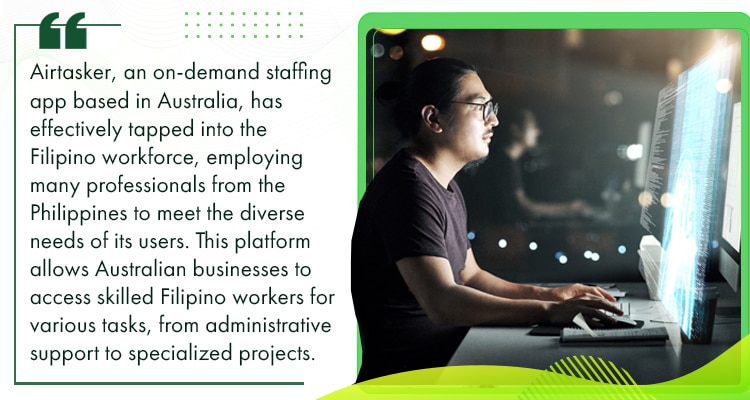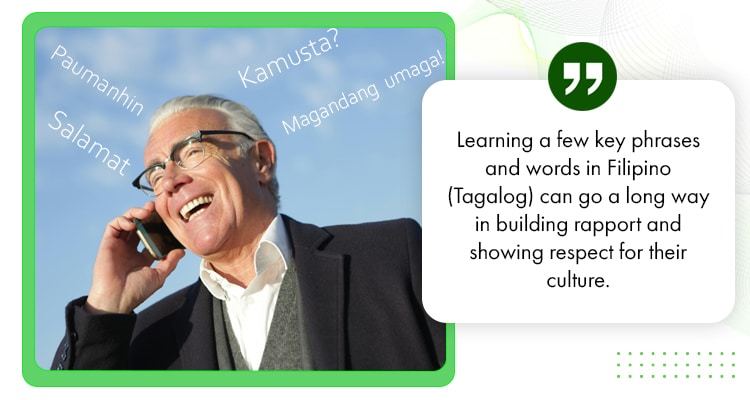Filipino remote workers have been the open secret of many fast-growing AU companies because of their strong work ethic, creativity, and loyalty.
For instance, the largest telecommunications company in Australia, Telstra, hired skilled Filipino call center agents to provide great services to their consumers, which has since been a cornerstone of their success.
Canva is another success story when it comes to hiring Filipino professionals. Back in 2014, Canva decided to delegate its back-office functions to the Philippines to save on costs – and also because the executives loved how the warm and family atmosphere inspired creativity. Today, Canva is valued at $26 billion.
Airtasker, an on-demand staffing app based in Australia, has effectively tapped into the Filipino workforce, employing many professionals from the Philippines to meet the diverse needs of its users. This platform allows Australian businesses to access skilled Filipino workers for various tasks, from administrative support to specialized projects.
But what exactly is it about Filipino work culture that makes working with their remote talents so rewarding?
More importantly, how can learning more about Filipino business etiquette, communication styles, and workplace relationships help YOUR business get similar results?

Read on to find out more.
What Makes the Filipino Work Culture Unique
Filipino work culture is a mixture of traditional values and modern influences.
To effectively manage Filipino teams and to maximize the benefits of this arrangement, it is important to understand some key elements that define how Filipinos approach work and interact in a professional setting:
Respect for Hierarchy
In the Philippines, respect for hierarchy is deeply ingrained in the Filipino business culture. This cultural norm significantly impacts workplace interactions and decision-making processes.
Tier 1: Filipinos Showing Respect for Authority
Filipinos show respect for their superiors by following orders without question. This attitude influences how decisions are made within a team, often deferring to the authority of managers and senior leaders. This deference can sometimes mean they might not readily speak up or challenge ideas, especially if they are new hires.
Tier 2: Filipinos When They Are Silent
Filipino professionals may remain silent, particularly in the presence of authority figures. This silence should not be mistaken for a lack of understanding or disengagement. Instead, it often signifies respect and a desire to carefully consider their responses. New hires, in particular, might take time to observe and understand the workplace dynamics before voicing their opinions.Additionally, Filipinos are generally non-confrontational by nature, which can be mistaken for not being direct or straightforward. This approach is rooted in a cultural preference for harmony and avoiding conflict, leading them to express their thoughts in a more subtle and considerate manner.
Tier 3: Filipinos Need to Warm Up First
Despite their respectful and sometimes reserved demeanor, Filipinos will ask detailed questions before starting a project. This practice is aimed at ensuring they fully understand the requirements and expectations, which helps them maintain accuracy and meet desired standards. Over time, as they become more comfortable within the team, they are likely to contribute more actively to discussions and decision-making processes.

Collectivism
Filipino society values collectivism, which translates into a strong sense of teamwork and community in the workplace.
Filipinos often prioritise group harmony and cooperation over individual achievements.
When managing Filipino teams, fostering a collaborative environment and recognising collective efforts can thus enhance productivity and job satisfaction.
To foster a collaborative environment, create opportunities for group collaboration, such as team-building activities and collaborative projects to strengthen interpersonal relationships.
Interpersonal Relationships at Work
Interpersonal relationships play a significant role in Filipino work culture.
Building strong personal connections with colleagues is essential for a harmonious and productive work environment.
Filipinos appreciate genuine interest in their well-being and often engage in social activities to strengthen bonds.
Investing time in getting to know Filipino employees on a personal level can lead to better communication and trust.
Learning about Filipino communication styles, which include a mix of indirect and direct methods, can help you build more fulfilling relationships on these nuances better.
- Indirect Communication. Subtle hints and non-verbal cues, such as saying I’ll try instead of saying no outright or avoiding eye contact to show discomfort, are indicative of a nature that prefers to avoid confrontation, in line with the cultural value of pakikisama (smooth interpersonal relationships).
- Direct Communication. Filipinos rely heavily on clear instructions, so it helps to be very specific when giving directions. In some cases, you may need to prompt your Filipino team for any further clarifications and encourage questions so that nothing is left to chance.
Building trust with Filipino employees through interpersonal interactions can enhance overall team dynamics and workplace harmony.

Effective Communication Strategies
Effective communication is another path towards successful collaboration with Filipino teams.
By understanding how Filipinos generally communicate, you can:
- Build Stronger Filipino Workplace Relationships. Adapting to Filipino communication styles helps create a more inclusive work environment for productive interactions and collaboration.
- Foster Trust. Demonstrating respect and cultural awareness builds trust with Filipino employees, making them feel valued and appreciated.
- Enhance Overall Productivity. Effective communication reduces misunderstandings and ensures that tasks are understood and efficiently executed.
Here are some key strategies to ensure effective communication with Filipinos:
Be Polite and Courteous
Politeness and common courtesy go a long way with Filipinos. Demonstrating genuine respect for their contributions and perspectives can help establish a better working relationship with them.
It sounds lofty, but it’s actually all about the little things:
- Greetings. A simple “Hello” or “Good morning” is always a great way to start conversations.
- Gratitude. Frequently express gratitude with phrases like “Thank you” or “I appreciate your help.”
Pay Attention to Non-Verbal Cues
Non-verbal communication plays a significant role in Filipino interactions. When managing Filipino teams, subtle gestures, facial expressions, and body language can be great indicators of what everyone’s really feeling:
- Smiles and Nods. These indicate agreement or understanding.
- Avoiding Eye Contact. This might signify discomfort or even disagreement.
- Gestures. Hand gestures or posture changes can convey enthusiasm or hesitation.
Learn Some Key Phrases and Words
Learning a few key phrases and words in Filipino (Tagalog) can go a long way in building rapport and showing respect for their culture.
Simple greetings, expressions of gratitude, and common phrases used in daily interactions can help break the ice and create a more comfortable atmosphere.

This effort demonstrates your willingness to honour Filipino business etiquette and can make your Filipino team feel valued.
Some useful words and phrases you can include in your vocabulary are:
- Greetings: “Kumusta?” (How are you?), “Magandang umaga” (Good morning).
- Gratitude: “Salamat” (Thank you), “Maraming salamat” (Thank you very much).
- Work-related Terms: “Trabaho” (task), “Amo” (boss), “Sweldo” (salary), “Magkano?” (how much?), “Kumpanya” (company).
- Polite Expressions. “Paumanhin” (Excuse me), “Pasensya na” (Sorry).
These effective communication strategies can make your working relationship with Filipinos more harmonious so that they’ll keep giving their 101% in helping you grow your business.
Navigating Time Differences and Deadlines
Managing Filipino teams effectively requires navigating time differences and meeting deadlines seamlessly.
Here are key things to remember when optimising schedules with your Filipino teams:
Utilizing Time Zone Differences for Extended Productivity
Taking advantage of the time zone differences between Australia and the Philippines can lead to extended productivity and continuous workflow.
Australian Eastern Standard Time (AEST) is typically 2 hours ahead of Philippine Time (PHT). During Daylight Savings Time, the difference extends to 3 hours.
That being said, here are some of the perks of a distributed team working in different time zones:
- Round-the-Clock Support. Filipino teams can do customer support outside Australian business hours, providing 24/7 service coverage.
- Relatively Faster Completion. Filipino teams can work on tasks during Australian off-hours, leading to a more continuous workflow and potentially quicker project completion.
Working in different time zones allows continuous progress on projects and potentially, quicker turnaround times.
Efficient Workflow Planning
Efficient workflow planning guarantees that tasks are completed on time, regardless of time zone differences, and it requires:
- Clear Assignments. Provide detailed instructions and deadlines to your distributed team to make sure they know what to do.
- Regular Check-ins. Schedule regular virtual meetings to monitor progress, address any issues, and provide feedback.
- Use of Project Management Tools. Use platforms like Trello, Asana, or Slack to track tasks, set deadlines, and maintain open communication.
Strategies to keep everyone on a distributed team aligned and on track include:
- Using Shared Calendars. Shared calendars, such as Google Calendar, keep everyone aware of important deadlines, meetings, and project timelines.
- Thoroughly Documenting Projects. Comprehensive documentation in tools like Confluence or Google Docs provides clear guidelines, task assignments, and project status updates.
- Establishing Consistent Communication Protocols. Set up regular check-ins and updates through platforms like Slack or Microsoft Teams to keep everyone informed about progress and changes.
Different Options for Working Schedules
Offering flexible working schedules can accommodate both Australian and Filipino team members for better work-life balance and productivity.
However, there are also several ways to go about it:
1. Synchronous Schedules. Ideal for roles requiring real-time collaboration, such as customer-facing ones. Filipino employees can start their shift earlier to match your business hours.
2. Asynchronous Schedules. Suitable for roles that aren’t client-facing and thus don’t require immediate responses, like software development or content creation. Tasks that are in progress can be handed off between teams for continuous progress.
3. Custom Shifts/Night Shifts. Effective for roles like IT support or monitoring, where 24/7 coverage is needed. Filipino team members can also work night shifts if your business caters to international clients.
Implementing these strategies can optimise the overall workflow and foster a strong, collaborative working relationship.
How to Build Trust and Strong Working Relationships
Effective training, fair treatment, and empowering your team with suitable autonomy is essential for achieving a harmonious and productive work environment.
Training and Feedback
Providing proper training and regular feedback helps build trust and demonstrates your commitment to your team’s development:
- Structured Training Programs. Implement comprehensive onboarding and continuous training programs to equip Filipino employees with necessary skills and knowledge.
- Regular Feedback Sessions. Schedule consistent one-on-one meetings to provide constructive feedback and discuss career development.
Fair, Consistent Treatment
Ideally, you want to create a merit-based environment where everyone can thrive:
- Equal Opportunities. Growth and promotion should be open to anyone based on their results and performance.
- Transparent Policies. Maintain clear and transparent workplace policies so everyone understands the rules and why they need to abide by them.
Autonomy and Empowerment
Empowering your Filipino team by giving them autonomy in their roles can lead to increased job satisfaction and productivity. This also involves:
- Delegating Authority. Allowing employees to take ownership of their tasks and make decisions within their areas of responsibility.
- Active Participation. Creating a culture where employees feel comfortable suggesting improvements and taking the initiative on projects.

By focusing on these areas, you can build a strong foundation of trust with your Filipino team.
Overcoming Cultural Barriers
Understanding Filipino work ethics and respecting cultural differences can lead to stronger collaboration and more effective communication.
Here are some strategies to overcome cultural barriers:
Make Allowances for Cultural Differences
Recognising and accommodating cultural differences is essential to managing Filipino teams effectively. Here are some ways to go about it:
- Flexible Communication Styles. Be open to different communication styles, whether direct or indirect, and adapt your approach accordingly.
- Acknowledgement of Social Norms. Respect cultural practices and norms, such as the importance of family, religion, and community.
A little empathy goes a long long way
Filipinos are known for their strong emotional bonds and deep sense of empathy, especially in times of loss and hardship. This emotional nature is rooted in their strong family ties, which form the cornerstone of Filipino culture. When someone close to a Filipino passes away, especially a family member, it is essential to practice and show sincere empathy. The sense of loss is profound, and the collective mourning is a testament to the close-knit relationships that define Filipino society.
Additionally, the Philippines is a country frequently affected by natural calamities and disasters. Typhoons, flooding, and earthquakes are common occurrences, often happening at least once or twice a year. These events not only test the resilience of the Filipino people but also highlight their capacity for empathy and community support. During such times, families and communities come together to support one another, demonstrating the strength of their familial and social bonds.
Understanding and acknowledging these aspects of Filipino culture can foster deeper connections and show respect for their enduring spirit in the face of adversity.
Open Dialogue
Encouraging open dialogue between Australian and Filipino teams is essential for bridging cultural gaps and creating an inclusive work environment.
Communication helps build trust and facilitates better collaboration. Here are some effective ways to promote open dialogue:
- Open Communication Channels. Allow team members to use communication tools like Slack or Microsoft Teams to share ideas, questions, and feedback in real-time.
- Anonymous Suggestions. Implement an anonymous suggestion box or digital tool where team members can safely share ideas or concerns without fear of judgment or reprisals.
- Collaborative Workshops. Organise workshops or brainstorming sessions that focus on collaboration and problem-solving so team members can interact, exchange ideas, and learn from each other in an open setting.
An open dialogue promotes a healthy work environment, strengthens relationships, and enables teams to work more effectively across cultural boundaries.
Mutual Respect
Being respectful helps create a positive work environment where all team members feel valued and appreciated.

Building mutual respect is key to a successful Australian-Filipino business collaboration and you can enforce these strategies:
- Value Contributions. Recognise and appreciate the unique skills and contributions of Filipino team members.
- Fair Treatment. All team members must be treated fairly and equally, regardless of cultural background.
- Cultural Sensitivity Training. Provide training to help team members understand and respect cultural differences.
Furthermore, mutual respect enhances communication for a more harmonious and productive workplace.
FAQs
When working with Filipino remote teams, there might be a bit of a learning curve involved, especially if it’s your first time.
Here are some frequently asked questions to help you shorten the said learning curve:
1. What are the most common challenges when working with Filipinos?
Some common challenges include dealing with cultural differences, such as the respect for hierarchy and indirect communication styles. Additionally, understanding the nuances of Filipino time management and accommodating time zone differences can be tricky.
Building trust and creating a results-based and flexible working environment is essential for overcoming these challenges.
2. How do you make collaborating with Filipinos as seamless as possible?
Establish clear communication channels and use collaboration tools like Slack or Microsoft Teams.
Be receptive to open dialogue and actively listen to team members’ feedback and ideas. Foster a culture of inclusivity and respect, and provide regular feedback to guarantee that everyone is aligned with the team’s goals.
3. What phrases are helpful to know when working with Filipinos?
Learning a few basic Tagalog phrases can help build rapport with your Filipino team. Some useful phrases include:
- “Kumusta?” (How are you?)
- “Salamat” (Thank you)
- “Paumanhin” (Excuse me)
- “Magkano?” (How much?)
- “Trabaho” (Task)
These phrases show your willingness to embrace their culture and can help create a more comfortable and engaging work environment.
Takeaways
Working effectively with Filipino teams offers a wealth of opportunities. By understanding cultural nuances, embracing open communication, and fostering trust, you can create a productive and harmonious work environment.
Are you ready to leverage these insights for successful collaboration?
Building strong relationships with your Filipino team can drive your business success and lead to a rewarding and enriching partnership. Take these strategies and create a collaborative future with your Filipino colleagues!
For more references that will help you grow your business — read here!
- Want FREE AI Prompts for Different Areas of Your Business? Check out these 100 AI prompts.
- Curious About How to SAVE and Maximize on Taxes? Learn more here.
- Ready to Build a FULLY Remote Team with the Right People? Click here.
- Check Out Our 1,000 Fully Vetted and Highly Talented Staff here.
Darren Aragon is a multifaceted writer with a background in Information Technology, beginning his career in research at Pen Qatar and transitioning through customer service to a significant role at Absolute Service, Inc. His journey into freelance writing in 2021 has seen him excel across various niches, showcasing his adaptability and deep understanding of audience engagement.




















